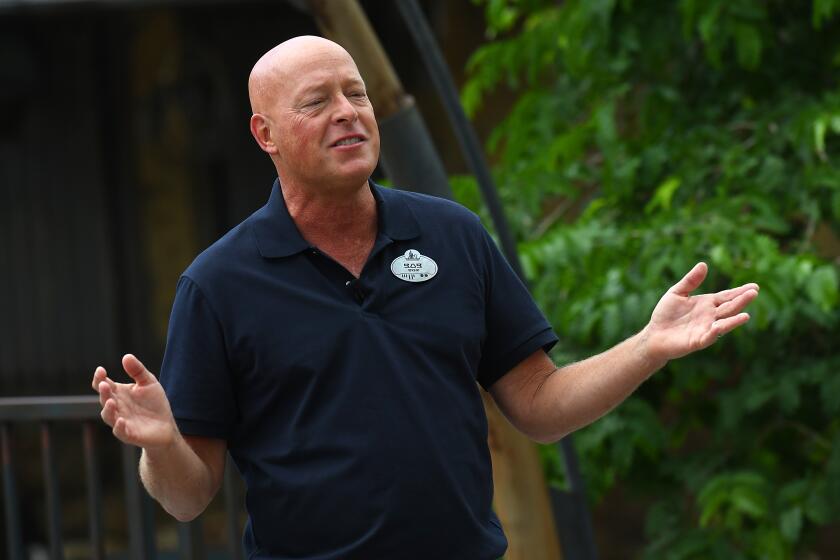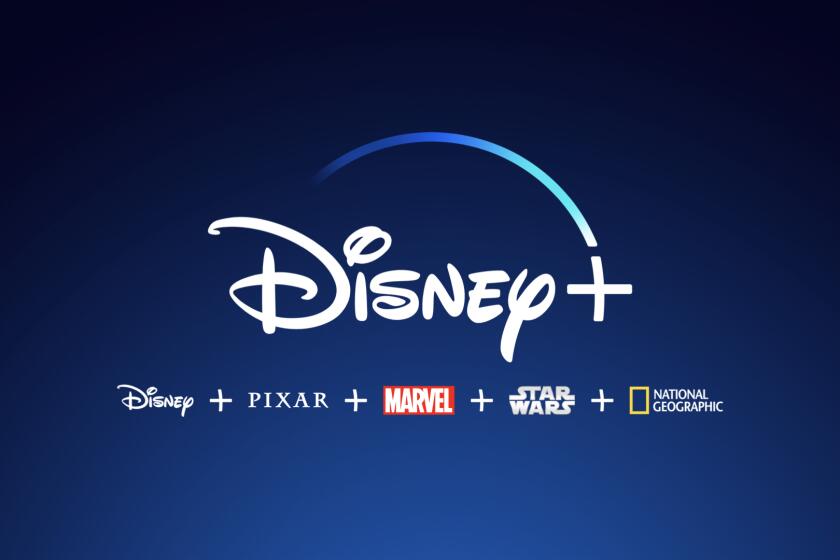Disney’s Bob Chapek opposes Florida LGBTQ school bill, seeks DeSantis meeting

- Share via
Walt Disney Co. Chief Executive Bob Chapek on Wednesday expressed concerns about Florida’s controversial bill meant to limit classroom instruction on sexual orientation and gender identity, after taking substantial heat for staying neutral.
Speaking during Disney’s annual shareholder meeting, Chapek said Disney had pledged $5 million to LGBTQ+ rights groups including the Human Rights Campaign, and said the company would sign the organization’s statement opposing anti-gay legislation.
The meeting comes as Chapek finds himself embroiled in a controversy over his response to the Florida legislation that forbids classroom instruction on sexual orientation and gender identity in kindergarten through grade 3 “or in a manner that is not age appropriate or developmentally appropriate for students in accordance with state standards.”
The proposal, which LGBTQ+ activists have dubbed a “Don’t Say Gay” bill, passed Florida’s state senate this week, and Republican Gov. Ron DeSantis is expected to sign it into law.
Chapek said he called DeSantis on Wednesday morning to “express our disappointment and concern that if the legislation becomes law, it could be used to unfairly target gay, lesbian, non-binary and transgender kids and families.”
DeSantis agreed to meet with Chapek and a small delegation of Disney LGBTQ+ leaders to discuss the bill and hear employee concerns, Chapek told investors.
DeSantis’ press secretary, Christina Pushaw, confirmed the call, saying, “This is the first time we have heard from Disney regarding HB 1557. The governor did take the call from Mr. Chapek. The governor’s position has not changed. No in-person meeting has been scheduled yet.”
Chapek said Disney was “opposed to the bill from the outset” but chose not to take a public stance “because we thought we could be more effective working behind-the-scenes, engaging directly with lawmakers.”
But he acknowledged that the effort was unsuccessful, and said the company would reassess its approach to advocacy and “political giving in Florida and beyond,” responding to criticism that Disney had contributed to politicians who supported the bill.
“I understand our original approach, no matter how well intended, didn’t quite get the job done,” Chapek said. “But we are committed to support the community going forward.”
Chapek on Monday sent a memo to employees explaining why he hadn’t publicly condemned the measure, even after meeting with a group of LGBTQ+ leaders at Disney. The company is a huge Florida employer, with tens of thousands of workers at Walt Disney World Resort.
Chapek has faced criticism for issuing a statement in support of Ukraine but not the LGBTQ community in Florida. The CEO doesn’t want the company to be a “political football.”
The Disney chief wrote that corporate statements “do very little to change outcomes or minds” and instead are “often weaponized by one side or the other to further divide and inflame.”
But the email prompted emotional public rebukes online, including some from creatives who have worked on Disney shows. Disney’s handling of the matter stands in contrast with former CEO Bob Iger’s criticism of certain anti-gay and anti-abortion legislation in Georgia.
The Animation Guild released a statement voicing “immense disappointment” with Disney’s response.
Wednesday’s event marked Disney’s first annual shareholder meeting since the departure of Iger as executive chairman at the end of last year. Iger served as chief executive for 15 years, handing the reins to Chapek in February 2020.
During the meeting investors approved a shareholder proposal asking Disney to disclose data on pay equity.
The proposal, which won the support of 59% of voting shareholders according to preliminary data, called on Disney to “report on both median and adjusted pay gaps across race and gender.” Disney had asked shareholders to vote against the measure.
Shareholders rejected other investor proposals that demanded greater political lobbying disclosures and a lowering of the threshold of votes required to call a special meeting.
Shareholders also voted against a call for an audit of Disney’s impact on human rights, which was proposed by an organization critical of the company’s business ties to China. Investors also shot down a proposed audit of Disney’s workplace diversity training from another group, which blasted the firm’s anti-racist programs as promoting “CRT,” or critical race theory.
Shareholders approved the company’s compensation plan for Disney’s top executives, with 84% voting in favor, 15% casting ballots against it and less than 1% abstaining.
Chapek, in his second year as CEO of the Burbank-based entertainment giant, had a total compensation package worth $32.5 million, including his salary, bonus and stock awards. The total more than doubled Chapek’s compensation in fiscal 2020, when top executives went without cash bonuses due to the pandemic.
As executive chairman, Iger took in more pay than his successor last year, earning $45.9 million in 2021 compared with $21 million for the prior year.
Chapek is on a mission to grow Disney+, the company’s flagship streaming service. Launched in 2019 to compete with Netflix, Disney+ has reached 130 million subscribers globally, though its gains tapered off last year amid increased competition. Disney last week said it is prepping a cheaper tier of the service with commercials as an alternative to its ad-free version, which costs a relatively inexpensive $8 a month.
Announced Friday, Disney did not disclose pricing for the ad-supported tier, which is meant to help Disney+ reach subscriber goals.
The company described the decision as a “building block” in its effort to reach 230 million to 260 million subscribers by 2024. Disney also characterized the tier as a response to demand from advertisers, after the company previously had indicated that commercials would hamper the user experience on Disney+. Disney’s other mass-market entertainment streamer, Hulu, already has tiers with and without ads.
During the meeting, Disney released a new trailer for the Disney+ show “Obi-Wan Kenobi,” featuring Ewan McGregor, who reprises his role as the Jedi master.
Disney’s parks have largely recovered from the downturn suffered during the COVID-19 pandemic. Revenue from Disney’s parks, experiences and products more than doubled to $7.23 billion in the most recent quarter, the company said in February. Operating income from the parks and production segment ballooned to $2.45 billion, compared with a loss of $119 million a year earlier.
Disney+ adds 12 million subscribers in the first quarter, significantly exceeding analysts’ expectations, and its stock rises 8%.
Overall, Disney reported revenue of $21.8 billion in the three months that ended in January, an increase of 34% from the same period a year earlier. The company posted profit of $1.15 billion, up from $29 million a year earlier.
More to Read
Inside the business of entertainment
The Wide Shot brings you news, analysis and insights on everything from streaming wars to production — and what it all means for the future.
You may occasionally receive promotional content from the Los Angeles Times.














